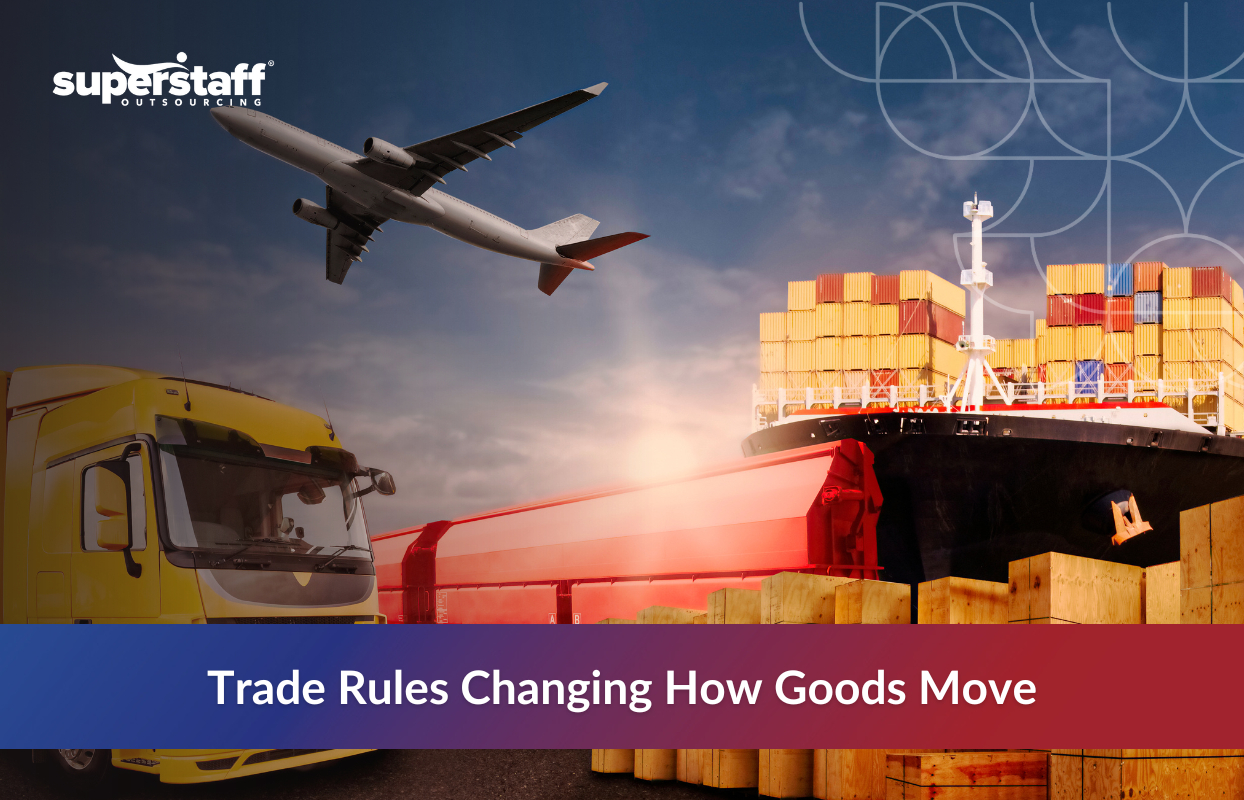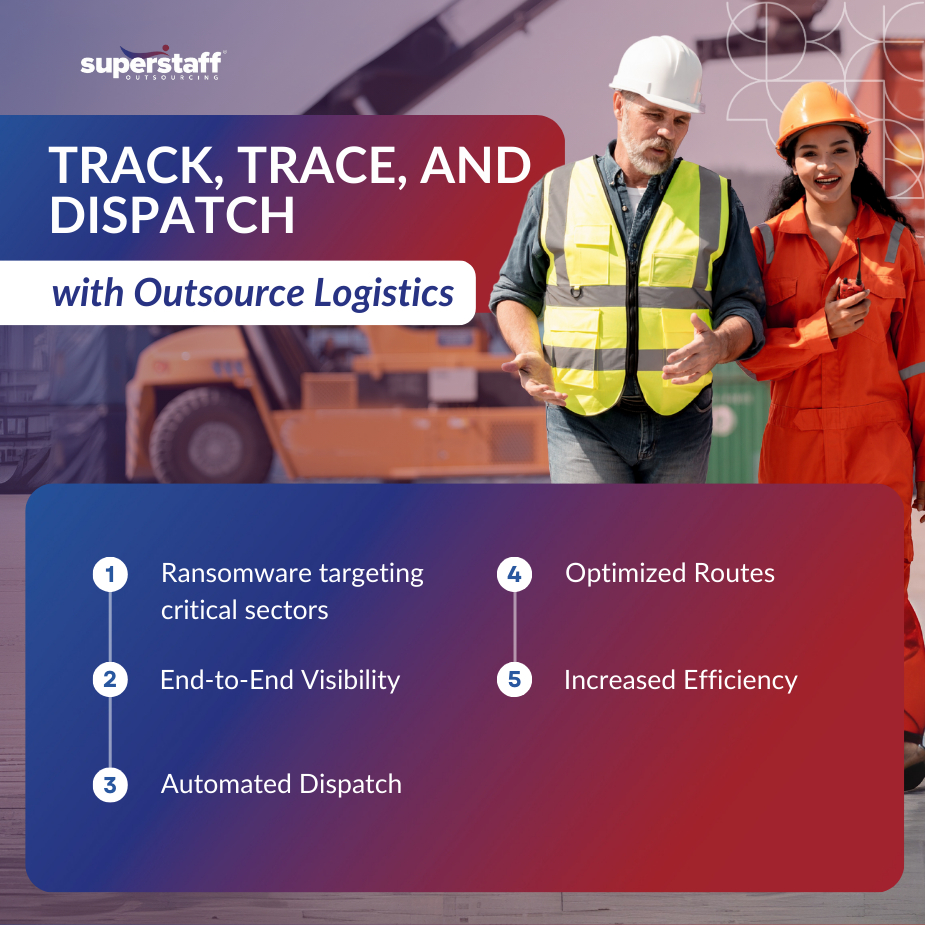
Trade policies in 2025 have introduced significant changes, impacting global supply chains and prompting logistics companies to adapt swiftly. The reintroduction of tariffs and stricter border controls has led to increased costs and delays. These sudden changes are pushing companies to find new ways to stay efficient and keep deliveries on schedule.
The impact of tariffs on logistics is especially evident in rising costs, rerouted shipments, and increased documentation demands. In response, many businesses to outsource logistics operations like dispatch, freight tracking, and compliance to stay flexible, cost-effective, and efficient. By offloading critical tasks like dispatch, freight tracking, and delivery documentation to skilled offshore teams, logistics firms can stay flexible, cut costs, and keep goods flowing—even when trade rules are in flux.
In this blog, we’ll break down how these revived policies are affecting logistics and why outsourcing is becoming a go-to strategy in 2025.
How Tariffs and Border Controls Are Disrupting Logistics
In 2025, the U.S. administration implemented a series of tariffs aimed at revitalizing domestic manufacturing. These include a universal 10% tariff on most imports, with higher rates on specific sectors such as automobiles and steel. Additionally, stricter border controls have been enforced to address concerns over immigration and drug trafficking.
These measures have led to:
- Delays in cross-border freight movement.
- An increased need for compliance and customs documentation.
- Domestic rerouting is causing backlogs.
As a result, logistics providers are seeking flexible solutions to maintain efficiency and control costs.
Outsourcing Track & Trace and Dispatch Helps Logistics Firms Stay Responsive
Real-time freight tracking and flexible routing are now must-haves in logistics. To keep up, many companies are outsourcing dispatch and track-and-trace operations.
Offshore dispatchers provide 24/7 support, making it easier to adjust routes quickly when delays occur. Track and trace teams keep shipments visible at every stage, helping solve problems before they escalate. There’s also growing demand for support with proof of delivery and shipping documentation, especially as customers expect faster updates.
In addition to outsourcing, many businesses are relying on third-party logistics 3PL services to handle core functions, from warehousing to transportation management, to adapt to these rapid shifts in trade rules and market demands.
-
Fast Adjustments, Clear Visibility
Outsourced teams give logistics firms real-time control over routes and shipments, reducing disruptions and improving delivery accuracy.
-
Documentation and Compliance Support
From POD verification to customs paperwork, offshore teams help ensure shipments meet customer expectations and regulatory demands.

Mitigating Risks Through Documentation and Compliance Support
As trade regulations tighten and border inspections become more frequent, logistics companies face growing pressure to maintain spotless documentation. Even minor errors in paperwork—like incorrect tariff codes or incomplete export declarations—can lead to costly delays, fines, or seized shipments.
Many firms are outsourcing for documentation and compliance support to avoid these setbacks. Offshore teams with expertise in customs requirements handle tasks such as tariff classification, commercial invoice preparation, and export filings. Their familiarity with global trade protocols ensures that paperwork is processed accurately and on time.
Outsourcing these functions doesn’t just reduce the risk of regulatory penalties—it also improves overall efficiency. With specialized teams handling the details, logistics providers can focus on core operations without getting bogged down by red tape. This level of precision and consistency helps keep goods moving and supports business continuity, even amid shifting trade policies.
Building Supply Chain Resilience: Why More Companies Outsource Logistics in 2025
Global trade is anything but predictable in 2025. From sudden tariff hikes to unexpected border delays, logistics firms need flexible solutions that can weather constant change. That’s where outsourcing proves its value.
-
Quick Response to Trade Shifts
Outsourcing makes it easier to scale operations up or down. When new policies disrupt shipping lanes or create backlogs, companies can adjust faster without overloading their in-house teams.
-
Less Pressure, Smoother Operations
Offloading tasks like dispatch, documentation, and compliance gives core staff more room to focus on planning and problem-solving. This helps prevent burnout and keeps day-to-day operations steady.
-
Spread Out the Risk
Running everything from one location leaves businesses vulnerable. Outsourcing across multiple regions helps keep goods moving even when one part of the supply chain hits a snag.
-
The Right Partner Makes the Difference
Success depends on choosing providers who understand freight, regulations, and communication. Countries like the Philippines and Colombia stand out for their strong logistics talent, infrastructure, and time zone alignment with the U.S.
Optimal Outsourcing Destinations: The Philippines and Colombia
As more logistics companies look for reliable outsourcing partners, the Philippines and Colombia continue to stand out as top choices. Both countries combine skilled talent, strong infrastructure, and business-friendly environments—key factors in today’s high-pressure supply chain landscape.
-
Skilled and Service-Oriented Workforce
The Philippines and Colombia boast large, educated labor pools with solid experience in shipping, dispatch, and freight tracking. Their teams are trained to handle time-sensitive logistics functions while maintaining accuracy and professionalism. High English proficiency in both countries ensures smooth communication with U.S.-based teams and customers.
-
Strategic Time Zone Alignment
With time zones that align well with North America, businesses in the U.S. benefit from extended operating hours. Offshore teams in the Philippines and Colombia can support real-time freight monitoring, dispatch coordination, and customer service without delay.
-
Built for Compliance and Scale
Both countries have invested in infrastructure that supports logistics operations, including digital connectivity and secure data systems. Their governments also offer incentives and policies encouraging foreign partnerships, making them ideal locations for compliance-heavy processes like customs documentation, POD verification, and export declarations.
For logistics providers seeking stable, cost-effective solutions in a volatile trade climate, the Philippines and Colombia offer the right mix of talent, timing, and trust, making them ideal locations for companies navigating the effects of U.S. tariffs on global logistics outsourcing.
Keeping Your Supply Chain Moving—No Matter the Trade Climate
SuperStaff offers logistics support that adapts as fast as global trade changes. From 24/7 dispatch and track & trace to POD verification and compliance assistance, our teams are equipped to handle high-pressure logistics quickly and accurately. By outsourcing logistics functions to SuperStaff, you gain scalable, responsive support aligned with your shipping strategy, every step of the way.
As tariffs rise and borders tighten, outsourcing becomes more than a solution—it’s a safeguard. Partnering with SuperStaff means gaining a logistics ally that helps you stay agile, compliant, and competitive in 2025 and beyond. Trade policy may shift, but your operations shouldn’t skip a beat. Let SuperStaff help you stay ahead of the curve.






